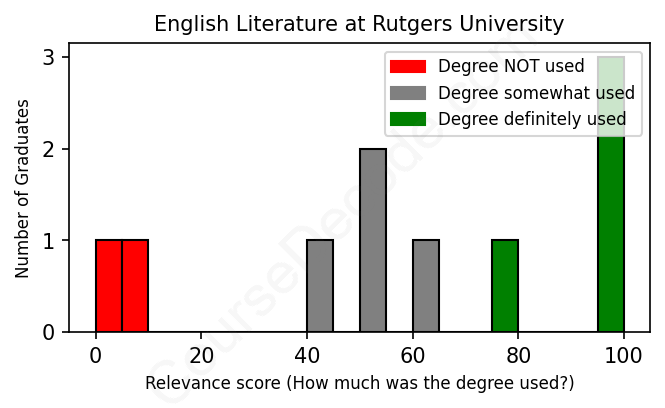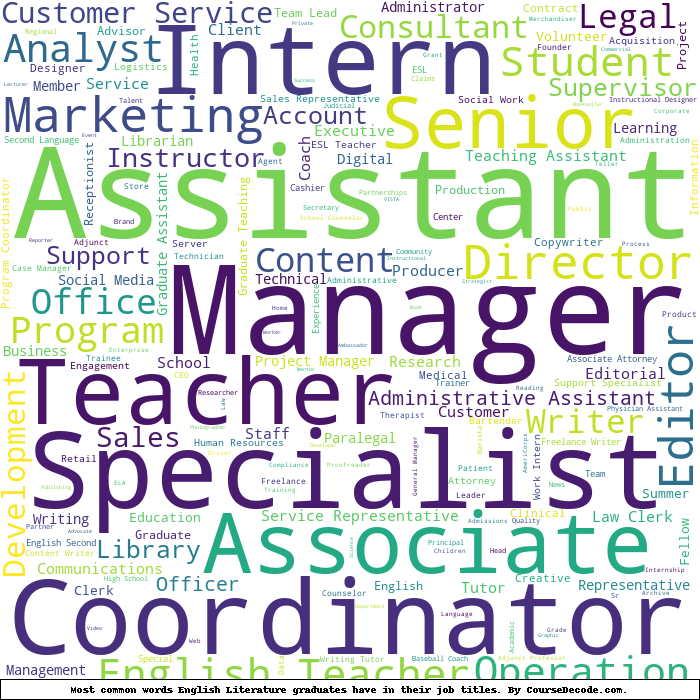
First, some facts. Of the English Literature graduates from Rutgers University we've analyzed , here's how many have used (or NOT used) their degree in their career:

These are estimates based on AI analysis of 10 LinkedIn profiles (see below).
The verdict? Below average. Overall, with an average relevance score of 58%, English Literature graduates from Rutgers University have a lower likelihood (-9%) of finding work in this field compared to the average graduate across all fields:
And for comparison, here's the chart for all profiles we've looked at across all degrees.
Also, after graduating, only 30% of these graduates have pursued further education other than another Bachelor's degree (such as a Masters degree or other), compared to the average across all profiles of 35%. This suggests a Bachelors degree is enough for most English Literature graduates, and it's normal to look for work straight after graduation.
See the details:
|
Relevance score: 97% We think this person has gone into a career highly relevant to their degree. We think this person has gone into a career highly relevant to their degree.
DEGREE INFOGraduated in 2017 from Rutgers University with a Bachelor of Arts - BA in English Literature. No other secondary education since. JOB HISTORY SINCE GRADUATIONAcademic Specialist Kean University Sep 2018 - Sep 2019 Content Specialist  24K Creative Jun 2019 - Oct 2019 Digital Content Specialist  LIXIL Water Technology Americas Sep 2020 - Apr 2021 Marketing Manager and Content Developer  Discover Chiropractic Aug 2019 - Oct 2021 Education Program Specialist  University of Massachusetts Medical School Mar 2021 - Oct 2021 Professional Writing Tutor  Ocean County College Jan 2021 - Sep 2022 Digital Content Specialist  Allwyn North America Oct 2021 - Present Senior Digital Content Specialist  Allwyn North America Feb 2023 - Present ABOUTSkilled in Research, Content Development, Teaching, Leadership, Public Speaking, and Resource Development. Driven Academic Specialist with a demonstrated history of working in both higher education. Strong education professional with a Bachelor of Arts - BA focused in English Language and Literature from Rutgers University. |
The top 10 most common jobs done by the graduates we've analyzed (ranked most common to least) are:
When it comes to graduates from Rutgers University with a degree in English Literature, they've landed in a pretty diverse set of jobs. On one hand, there are clear connections to their major, especially in roles like Writing Tutor, Content Specialist, and Educator, where skills like writing, analysis, and communication are key. These jobs allow them to leverage their love for literature and language in a very direct way. On the other hand, many have ventured into quite unrelated fields, like project management in the military or roles in legal settings, which tend to focus more on administration or specific technical skills rather than literary analysis. It's intriguing to see how some graduates completely align their careers with their passion for literature while others utilize just a sliver of those skills in different, sometimes unexpected directions.
Overall, it seems like while some of these jobs are undeniably relevant to English Literature, a significant chunk drift away from the core competencies taught in the program. Positions like writers or educators make a solid case for keeping the literary flame alive, but there’s also a noticeable number of graduates who have taken paths where their English Literature degree is just a stepping stone rather than a focal point. In the end, graduates from this program display a mix of creativity and practicality, showing that an English Literature degree can lead in various directions, some of which might feel a bit far from the classroom or the library.
Here is a visual representation of the most common words in job titles for English Literature graduates (this is across all English Literature graduates we've analyzed, not just those who went to Rutgers University):

Looking at the career paths of Rutgers University English Literature graduates, it seems like they have pretty diverse trajectories. Many of them landed jobs that seem somewhat related to their degree early on—like writing, content creation, and even education. For example, graduates from the class of 2014 and 2017 found their footing as writers and content specialists, while even the more recent graduates are jumping into roles such as ELA teachers. These roles typically leverage their English skills, and that's a good sign for anyone worried about how an English degree will translate into real-world jobs.
However, as we dig a bit deeper, we also see some graduates veering into areas that feel a bit disconnected from English Literature. We have folks who ended up in positions like real estate and administrative roles. This isn't to say these careers are bad; they just indicate a shift from the traditional paths you might expect for English majors. Fast forward five or ten years post-graduation, and while some graduates continue to climb the ladder in education, writing, or content roles, others seem to find themselves in careers that might not relate much to what they studied, like project management or business continuity at the Department of Defense. Overall, it looks like a mix of solid, relevant careers alongside some that stray from the literary world, which is totally normal for many degrees!
Honestly, a Bachelor’s degree in English Literature can be a mixed bag, but generally, it leans towards being on the challenging side. You'll be reading a ton of classic and contemporary works, analyzing themes, characters, and historical contexts, and then writing essays that demand a good deal of critical thinking and creativity. It requires a lot of reading and writing, which can be tough if that’s not your jam. At Rutgers, you’ll also probably have some engaging professors and a variety of classes, which can make the workload feel a little less daunting. So, while it’s definitely not a walk in the park, if you love literature and can manage your time well, it can be a rewarding experience!
Most commonly, in the LinkedIn profiles we've looked at, it takes people 4 years to finish a Bachelor degree in English Literature.
Looking at these graduates from Rutgers, it seems like there’s a bit of a mixed bag when it comes to their earnings. The folks who have landed jobs in government and military positions, like the Operations Planning and Analysis Coordinator or the Senior Business Continuity Program Manager, are likely pulling in solid salaries—especially since those roles typically pay well. On the flip side, the graduates working as writers, personal trainers, or in retail like the book seller and farm market associate might not be making as much, but those jobs might bring them personal satisfaction or flexibility, which can be worth something too. Overall, if you’re aiming for the higher income bracket, leaning towards fields like tech, government, or specialized areas tends to pay off more than the arts and education routes, which often come with lower starting salaries.
Here is a visual representation of the most common words seen in the "about" section of LinkedIn profiles who have a Bachelor degree in English Literature (this is across all English Literature graduates we've analyzed, not just those who went to Rutgers University). This may or may not be useful:

Here are all colleges offering a Bachelor degree in English Literature (ordered by the average relevance score of their English Literature graduates, best to worst) where we have analyzed at least 10 of their graduates: